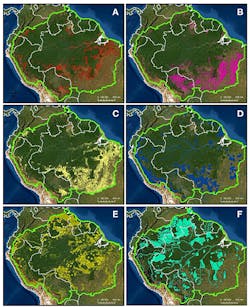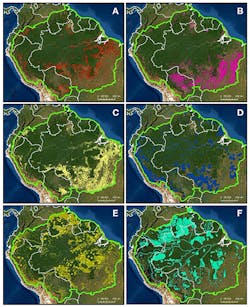Is the Rainforest Now Contributing to Global Warming?
For those of you who were not in my eighth grade science class, here’s how I explain photosynthesis:
In other words, green leaves absorb CO2 and convert it to O2.
Of course, it’s really not that simple. Plant cells contain small organelles (subcellular structures with specific functions within the cell) called chloroplasts, which store the energy from sunlight. The actual light-absorbing substance within the chloroplast is a pigment, chlorophyll, which gives leaves their green color. During photosynthesis, the plants take in both CO2 and water from the environment, where the CO2 is converted to glucose, which is stored in the plant for its energy, and the water is converted to O2 and released back into the environment.
Most of our planet’s O2 comes from photosynthesis, and, according to NOAA, at least half – and perhaps as much as 80% – comes from oceanic plankton, i.e. drifting plants, algae, and some bacteria that can photosynthesize. That’s a higher percentage than all of the tropical rainforests on land combined. Unfortunately, most of that is consumed by marine life and by decaying marine plants and animals. So the portion of O2 not produced by phytoplankton photosynthesis is produced by photosynthesis by trees, shrubs, grasses, and other plants on land, which is why the tropical rainforests have for many years been considered critical to the planet’s survival.
But a recent study entitled Carbon and Beyond: The Biogeochemistry of Climate in a Rapidly Changing Amazon concludes that the Amazon rainforest, the world’s largest tropical rainforest, is likely to now be a net contributor to global warming and is a failing ecosystem.
In a groundbreaking study, 30 researchers from all over the world went beyond the usual research for the Amazon Basin, which typically concentrated on the carbon cycle and its impact on climate change, and instead focused on providing a “state-of-the-science synthesis of the inter-related climate effects of natural and anthropogenic change agents in the Amazon Basin and their persistent uncertainties with particular consideration given where the pattern and scale of the effect are large but not regularly considered alongside CO2”.
The study found that human impacts – ecological, political, socioeconomic, and cultural – are as diverse as the rainforest itself. These impacts, or drivers, include forest loss due to agricultural conversion and cattle ranching; illegal logging; construction of reservoirs and hydroelectric plants; and mining and oil wells.
Fires, both natural in origin and intentionally set, have also contributed to forest loss. In addition to the anthropogenic impacts, natural events – more severe rainfall and drought events – have also adversely affected the rainforest.
Clearly, the crisis in the Amazon rainforest is not just about carbon alone. And much of the damaging activities can be controlled, if government has the political will to make it happen.
Recently, former Sen. John Kerry, the newly appointed U.S. Special Climate Envoy, met with Brazil’s Foreign Minister and Environment Minister to discuss deforestation in the Amazon Basin. Although the region includes territory belonging to nine nations, approximately 60 percent of the rainforest is located in Brazil.
Brazil and the U.S. have had a formal trade agreement since 2011, and in 2019, Brazil was the U.S.’s 14th largest trading partner, with more than $100 billion in bilateral goods and services.
Memo to Washington: We have some leverage now. It’s time to step up and use it!
#########
A regular contributor to HPAC Engineering and a member of its editorial advisory board since 2012, Clark, LEED AP, O+M, is a principal at Sustainable Performance Solutions LLC, a south Florida-based engineering firm focusing on energy and sustainability. Email him at [email protected].
About the Author
Larry Clark
A member of HPAC Engineering’s Editorial Advisory Board, Lawrence (Larry) Clark, QCxP, GGP, LEED AP+, is principal of Sustainable Performance Solutions LLC, a South Florida-based engineering firm focused on energy and sustainability consulting. He has more than two dozen published articles on HVAC- and energy-related topics to his credit and frequently lectures on green-building best practices, central-energy-plant optimization, and demand-controlled ventilation.

